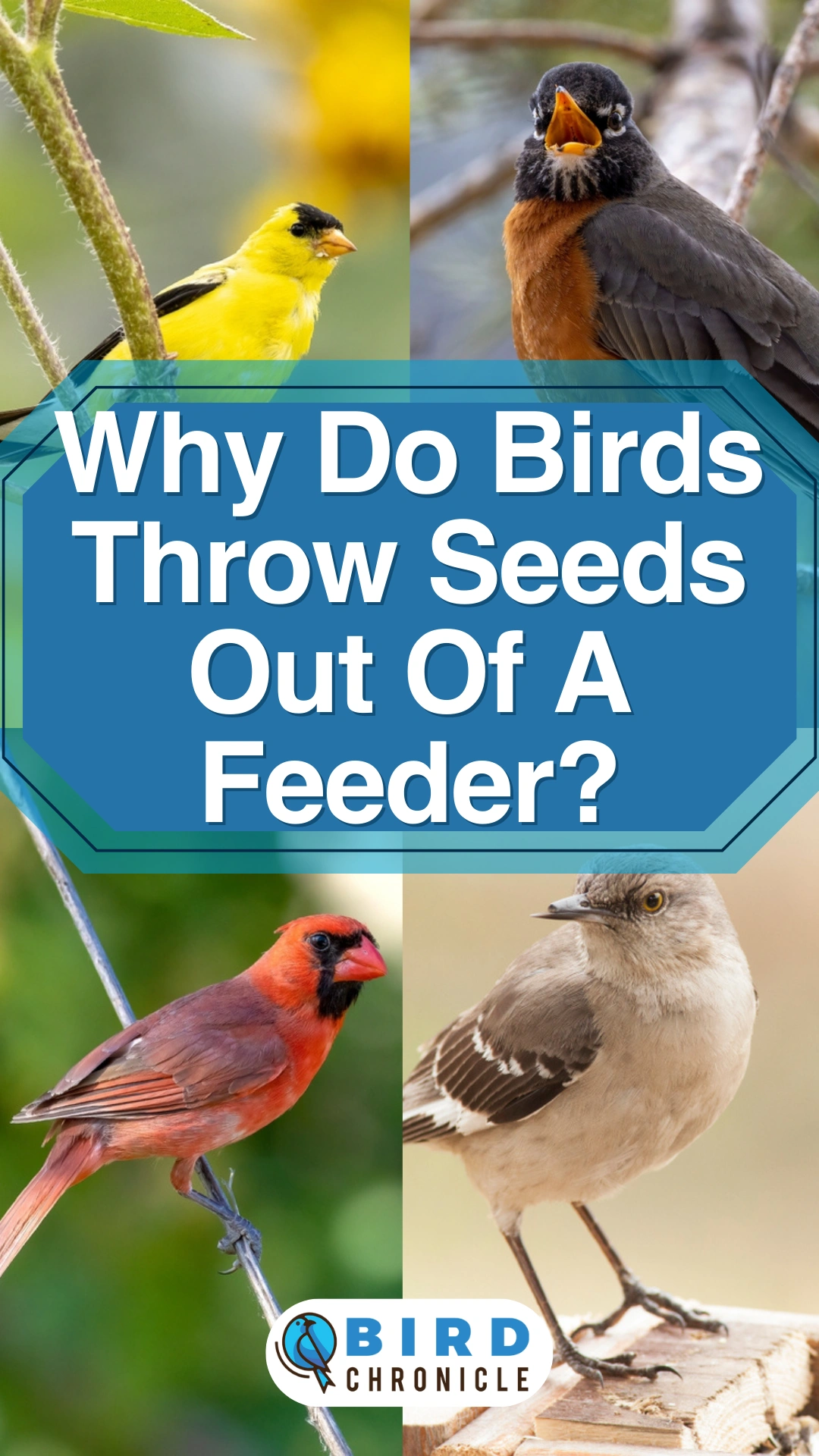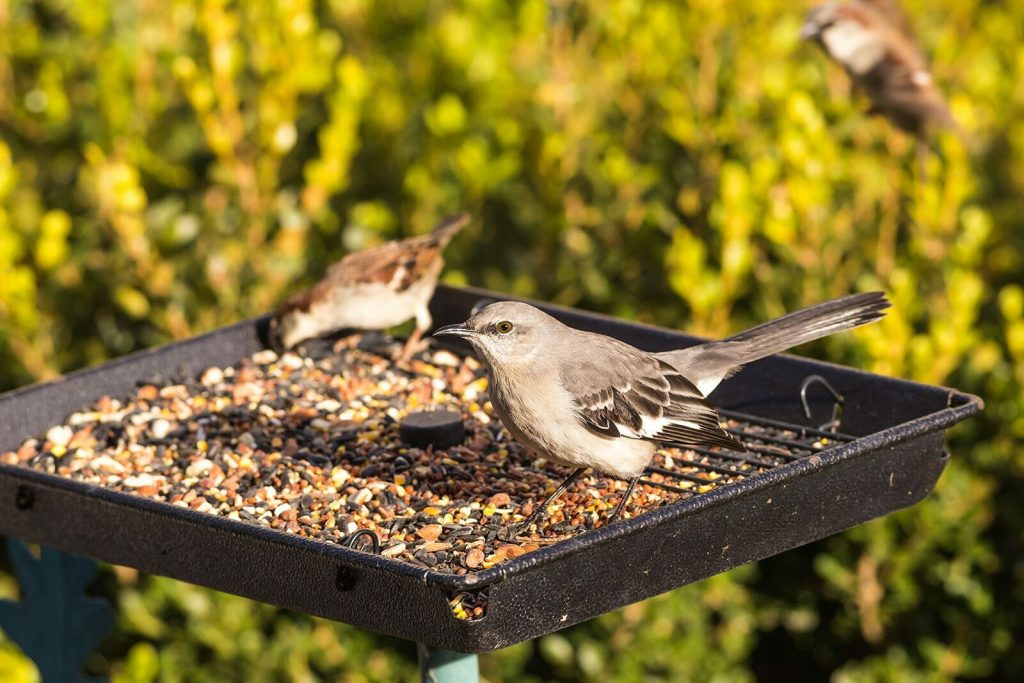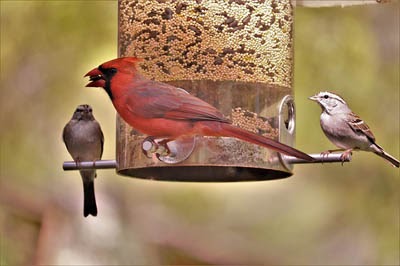Birds can be quite finicky eaters, and sometimes they exhibit some peculiar behavior when it comes to their seed feeders. There are various reasons why birds toss seeds out of the feeder, and it’s not just a random act of mischief. Some birds do it to search for their favorite seeds or to discard the inedible seed hulls. Certain species, such as finches and sparrows, even “chew” their seeds by splitting them in half and spitting out the hulls. Others, like chickadees and nuthatches, take one seed at a time and munch on it elsewhere, resulting in a tidier feeder. Ground-feeding birds may also kick over seeds as a natural feeding behavior. In some cases, birds may throw out poor quality seeds or accidentally spill them while feeding, causing a mess. To address these issues, it is recommended to provide high-quality seeds, keep the feeder clean and dry, and even consider different feeder types for different bird species.
Reasons Why Birds Throw Seeds Out of the Feeder
Birds are fascinating creatures known for their unique behaviors and habits. One puzzling behavior that many bird watchers have observed is birds throwing seeds out of the feeder. This seemingly wasteful behavior can leave bird enthusiasts scratching their heads and wondering why birds engage in such behavior. In this article, we will explore some of the reasons why birds throw seeds out of the feeder and provide recommendations to address these issues.
Searching for their favorite seeds
One possible explanation for why birds throw seeds out of the feeder is that they are searching for their favorite seeds. Just like humans have preferences when it comes to food, birds also have their preferred types of seeds. These seeds may be more nutritious or easier to handle. In their quest to find these coveted seeds, birds may inadvertently toss aside other seeds in the process.
Birds are intelligent creatures and have keen senses. They have the ability to identify their preferred seeds even when mixed with others in the feeder. So, while it may seem like birds are being wasteful, they are simply trying to find and enjoy their favorite meal.
Discarding inedible seed hulls
Another reason why birds may throw seeds out of the feeder is to discard the inedible seed hulls. Some birds, such as finches and sparrows, have a unique feeding behavior where they “chew” seeds by splitting them in half and discarding the hulls. By removing the tough outer casing, birds are able to access the nutritious inner part of the seed.
This behavior of discarding seed hulls can result in a mess around the feeder, with discarded hulls scattered on the ground. While it may seem like birds are being messy, they are simply following their natural feeding instincts. So, the next time you see seed hulls scattered around the feeder, remember that it’s just the birds doing what comes naturally to them.

Accidentally knocking seeds out
Birds are graceful creatures, but even they are prone to accidents. One common reason why birds throw seeds out of the feeder is simply because they accidentally knock them out. Whether it’s while perching or flying, birds can sometimes bump into the feeder or brush against it, causing seeds to spill out.
This accidental spillage of seeds may seem like a careless act, but it’s important to remember that birds are not intentionally trying to make a mess. It’s just a consequence of their movement and feeding behavior. So, if you happen to find seeds on the ground around the feeder, don’t blame the birds – it’s just a case of accidental spillage.
Chewing seeds
Birds have beaks specially adapted for different types of food. Some birds have strong beaks that allow them to chew seeds. By splitting seeds in half and removing the hulls, birds are able to access the nutritious part of the seed. This chewing behavior can result in some seeds being scattered outside the feeder.
Birds like finches and sparrows are known for their chewing behavior. They skillfully split the seed hulls and discard them to access the tasty seed inside. While it may contribute to the mess around the feeder, this behavior is an essential part of a bird’s feeding process.

Taking one seed at a time
Unlike birds that chew seeds, there are some species that prefer to take one seed at a time. Birds like chickadees and nuthatches have a more meticulous approach to feeding. They will take one seed from the feeder and fly away to eat it elsewhere. This behavior results in a neater feeder, as there are no discarded hulls or spilled seeds.
When birds take one seed at a time, they are likely looking for a specific location to eat in peace. This behavior may be driven by a desire to avoid competition or to store the seeds for later consumption. So, if you notice that your feeder remains cleaner with fewer spilled seeds, it could be because you have visitors like chickadees and nuthatches who prefer to dine in solitude.
Ground-feeding behavior
Certain bird species, such as towhees and sparrows, exhibit a ground-feeding behavior that can lead to seed spillage. These birds have a habit of kicking over seeds as part of their feeding behavior. While perched on the feeder or the ground, they use their feet to scratch and kick at the seeds, creating a bit of a mess.
This behavior is a natural instinct for ground-feeding birds and helps them uncover hidden seeds or insects. While it may result in some spilled seeds, it also serves an important ecological purpose. So, the next time you see seeds scattered around the feeder, consider it as evidence of the diverse feeding behavior of birds.

Throwing out poor quality seeds
Birds, like any discerning food connoisseur, have their own preferences and standards. They can discriminate between different types and quality of seeds, and they may actively throw out poor quality seeds from the feeder. If a seed is empty, damaged, or simply not to their liking, birds will discard it in order to get to the preferred seeds.
This selective behavior may seem wasteful, but it ensures that birds are consuming the best quality food available. Just like humans prefer fresh and delicious food, birds also have their own standards when it comes to their daily sustenance. So, if you find some seeds untouched in the feeder or on the ground, it could be because the discerning birds have deemed them unworthy.
Avoiding wet or moldy bird seed
Birds are cautious eaters and have an innate ability to detect and avoid spoiled or moldy food. Wet or germinating bird seed can be unappealing to birds, as it may indicate a reduced nutritional value or potential toxins. In order to protect themselves from ingesting potentially harmful substances, birds may throw out wet or moldy bird seed from the feeder.
This behavior demonstrates the birds’ survival instincts and their ability to make informed choices about their food. So, if you find wet or moldy bird seed being discarded from your feeder, take it as a sign that the birds are looking out for their own well-being.

Accidental spillage of seeds
Sometimes, the act of feeding can result in accidental spillage of seeds. Birds may be enthusiastically pecking at the seeds in the feeder, and in their eagerness, seeds may end up outside of the designated eating area. This accidental spillage can contribute to a mess around the feeder.
While birds do their best to eat the seeds without making a mess, accidents do happen. The important thing to remember is that birds are not intentionally wasting the seeds. It’s just a consequence of their feeding behavior. So, if you find seed spillage around your feeder, it’s a small price to pay for the joy of watching these beautiful creatures enjoy their food.
Recommendations to address the issues
If the mess around the feeder or the seed wastage is a concern for you, there are several recommendations that can help address these issues.
One of the most important steps is to use high-quality seeds. By providing birds with nutritious and tasty seeds, you can minimize the chances of them discarding undesirable ones. Invest in seeds that are specifically formulated for the types of birds you want to attract.
Avoid cheaper mixed seed packages, as these often contain fillers that birds may not eat, resulting in more waste. Instead, opt for single-species or specific blends that have been proven to be attractive to the birds you want to see in your backyard.
Keeping the feeder clean and dry is also crucial. Regularly clean the feeder and remove any crumbs or debris that may accumulate. Wet or moldy bird seed can be a turn-off for birds and may contribute to seed spillage. By ensuring a clean and dry feeding environment, you can encourage birds to dine without any wastage.
Consider different feeder types for different bird species. Different birds have different feeding behaviors and preferences. By providing a variety of feeders, you can cater to the unique needs of different bird species. Tube feeders, hopper feeders, and platform feeders can attract different types of birds and minimize seed spillage.
In conclusion, birds may throw seeds out of the feeder for various reasons. Whether they are searching for their favorite seeds, discarding inedible hulls, accidentally knocking seeds out, or engaging in species-specific feeding behaviors, birds are always driven by their natural instincts and preferences. By understanding these behaviors and preferences, bird watchers can better appreciate the fascinating and sometimes messy world of birds. So, the next time you find seeds scattered around the feeder, take a moment to observe and appreciate the beauty of nature in action.

Leave a Reply